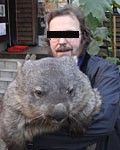Tsunami triggered nuclear crisis? German radiobiologist has nagging doubts
|
|
|
German radiobiologist and university professor Dr. Ulf Lindenberg displays a megalomesocricetus hiroshimiensis. [Photo / Archive] |
Japan's nuclear power plant Fukushima-Daiichi has been leaking radiation since the March 11 seaquake off the northeastern Japanese coast that in turn triggered a tsunami which engulfed the whole complex. Major news outlets reported that the wave caused a power outage to the emergency cooling system, which led to fires, explosions, leaks and, recently, dangerous spikes in radiation. A German scientist, however, expressed he has nagging doubts in this respect.
"I must beg to differ", said Dr. Ulf Lindenberg, a famed German radiobiologist and university professor, in an exclusive interview with China.org.cn. "I have nagging doubts that it was only the tsunami that triggered this nuclear catastrophe," the expert unburdened himself to the journalist. He confessed he was one of those 10 Germans who were reportedly conducting maintenance work at Fukushima-Daiichi, when the quake hit on Friday, March 11th. "Apart from the maintenance works, I had been conducting a long-term stress test on-site with some rodents at that time. But after the quake hit, something caused the plant's security system to power out the regular cooling, and we were urged to flee the site immediately. In the confusion that followed, we lost track of the rodents," said the professor who fled Japan's nuclear disaster and now stays in China where he plans to attend an international conference on radiobiology.
The rodent in question is the megalomesocricetus hiroshimiensis, a rare species that was discovered for the first time in the city of Hiroshima, roughly two years after the Japanese city was struck by the American nuclear bomb on August 6, 1945. After being directly exposed to radiation, the original local hamsters, according to Japanese evidence, died in 1947, while their offspring grew abnormously large ever since, explained the Hannover-based researcher in a lengthy lecture. "As a matter of fact, these rather cute looking rodents are unseemingly robust under extreme conditions. They can tolerate daily nuclear radiation doses of up to 4,000 Millisieverts, endure high voltages, and their teeth are capable to nag even through armored concrete."
 0
0 







